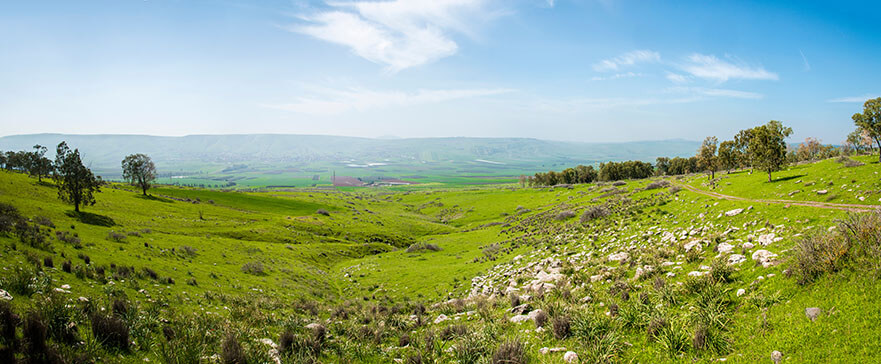“The lone and level sands stretch far away.”1
And then there is green.
It’s a flash of fertility amidst unforgiving wastes and dunes, a stark contrast between life and death. As if to mock the lonely desert, a land of community and fellowship thrives. On one side lie lands that speak of loss and hopelessness; on the other, a land of promises. Seemingly destined for obscurity, instead she was the object of covenants that vaulted her into historical importance disproportionate to her diminutive size.
She’s known as the Holy Land, the Levant, or perhaps her most enduring name, the land of Israel, for Israel is her inescapable heritage. As Israel, she made her mark, seemingly vanished, and rose to prominence again and again.
The Land’s Beginnings
Long ago the land was home to an ancient civilization in the storied town of Jericho; many nomadic settlers came and went. Those that stayed became loose confederacies of power at best that barely extended beyond the walls of their towns. Early empires cast their eye on the rich and fertile strip of land that rose out of the desert with green and lush plains, snowy mountains, and access to the sea—a crossroad of powerful civilizations.
Whoever controlled this otherwise forgotten land could control a large portion of international commerce, as natural pathways bypassed the arid lands to the east. She found herself under the sway of the prestigious lands of the Hitittes, the Mittani, and Egypt. Always a part of someone’s plan but never one to make those plans, she found herself caught between international struggles quite often, as the local Canaanites, vile and treacherous, could never band together for any meaningful time to make a power of their own.
The Rise of Israel
That all changed when the children of Abraham came. United under their common promise of land, they poured unchecked into an area the Egyptians themselves regarded as full of an immoral people. As Canaanite ambassador after ambassador came to Pharaoh’s court to complain of the invading habiru (a term for marauding nomads used to refer to the Israelites), Pharaoh ignored their pleas for help, content to let the sacrificers of children wither on the vine.
And so rose Eretz Yisrael, the land of Israel, now with a people that were truly her own. Soon, she was prosperous, unified, and, for the first time in her history, influential. Recognized by all the surrounding powers, she became a blessing to the region’s stability. Great caravans could take better advantage of the natural roads and passes without fear of raiders and the like. Powerful rulers like Kings David and Solomon graced the pages of history, inspiring awe from the palaces of Ur, Nineveh, Damascus, Thebes, and Sheba. Solomon built a magnificent temple, a marvel of its day that proclaimed the truth of the Hebrew God, Yahweh, who had made good on His promises to the children of Abraham.
Perseverance of the Chosen People
As her influence waned under lesser rulers, Israel’s place was still secure, as no one now underestimated that small piece of land. For a time, she lost her people, as empires again swept in, mercilessly killing and deporting. Yet still her children returned, for they were seemingly now inseparable from her land. Eretz Yisrael and her Chosen People were one.
For a time she lost her people as empires again swept in, mercilessly killing and deporting. Yet still her children returned, for they were seemingly now inseparable from her land.
Again, she drew astonishment from the world, making a name for herself even in the wake of Alexander the Great, who himself had been shown the Holy Scriptures produced by that very land that spoke of his coming. Soon there was a new temple, a wonder of the ancient world. Industry thrived in the seemingly unpromising Dead Sea, and the pathways of commerce again flowed freely and securely through her now Roman roads.
Though her darkest time was soon to come, the echoes of the promise never completely faded. Her people again were faced with death and were ripped from their homelands, leaving only a small number behind to remain in the land (for they would never again completely be gone). Centuries crawled by, then a millennia, and nearly another. Overlooked by great powers for a while, the ancient towns were forgotten. Dunes overgrew their boundaries. Commerce was long gone. Bloody wars had been fought, for sure; but as time went on, even those faded into distant memory.
The Promised Land Prevails
Yet she had never died out in the hearts of her people. “Next year in Jerusalem” was the sincere prayer and voice of the Jewish people. The land and the people were still as one, and Israel awaited to receive her people once again—and she did. Once again, against great odds, Israel arose again. No other nation that had been vacant for so long had returned from the pages of history, and none had faced such vicious and overwhelming odds at doing so.
No other nation that had been vacant for so long had returned from the pages of history, and none had faced such vicious and overwhelming odds at doing so.
Nonetheless, the Land of Promise returned. Israel came back and remains to this day. Her forgotten towns are alive, her dunes are tamed, and her lush lands have bounded back. She is prosperous, powerful, and the center of worldwide attention. From agriculture to high-tech industry, she again makes her mark, surging ahead of her neighbors and enemies alike.
Efforts to extinguish her all have utterly failed. Her historical foes have come and gone, never to return. Like the lost words of the titular hero in Percy Bysshe Shelley’s poem “Ozymandias,” she can say, “Look on my works, ye mighty, and despair.”
Endnote
1 Percy Bysshe Shelley, “Ozymandias,” The Examiner, January 11, 1818.
Photo Credit: Adobe Stock




